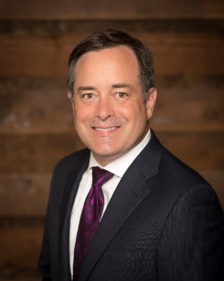Meet John Otter: Washington Policy Center Board Chairman
 This interview was conducted on August 9, 2018.
This interview was conducted on August 9, 2018.
John Otter is the Chairman of the Washington Policy Center Board of Directors. John told WPC about how his travels to the Soviet Union and Cuba as a teenager shaped his belief in free-markets and what he’s learned from being involved with WPC.
WPC: How did you hear about WPC? How did you become involved as a board member?
John: A friend with whom I served with on the Dale Chihuly’s Pilchuck Glass School board thought I would be a good add to another art related organization, Poncho. He set up a meeting with the new president of the Poncho board, Janet True. It was the first time Janet and I had met, and being in Seattle, I like to ask a light political question to gauge the required level of political correctness. That question turned into the topic of the lunch and ended with an invitation to attend the 2008 WPC Annual Dinner. I later accepted two seats at her table.
It was the first time I had heard of WPC and when the official invitation followed, I called Janet and handed back my two tickets. I had just acquired my own table. The keynote in 2008 was the President of the Czech Republic, Vaclav Klaus. He was going to tell the story of how he led his country from communism and socialism and into the free-market and further, how global warming and the European Union were then acting counter to those efforts.
When I walked into the event, a full Sheraton ballroom packed with about 1,100 other people, I was very surprised. I figured if there were that many people interested in this topic, while standing on Sixth Avenue between Pike and Pine, I knew there was hope for Seattle and our state.
A few months later, I was asked to join the WPC board and accepted without hesitation.
WPC: How did you become interested in the free-market school of thought?
John: I was raised in a house with politics on one side (my dad) and a global business on the other. My dad, while working for the family business, helped broaden our global reach while serving part-time in various elected positions in the Idaho state government. He always preached the power of the free-market and free enterprise system that we enjoy. When you trade goods with another country, you are much less likely to trade bombs. To this end, our company supplied french fries to the first McDonalds in Russia and opened manufacturing in China and elsewhere around the globe. He eventually became Governor of Idaho and today is still opening trade with other countries.
In the mid-80s he helped found the Center for the Study of Market Alternatives on the College of Idaho’s campus, a very early version of today’s WPC. The Center led a trip for a group of high school students to see what life was like behind the Iron Curtain. On the trip, at the age of 17 in 1986, I got to stand in front of the tomb of Vladimir Lenin in Red Square. There were a lot of great lessons on that trip. Most noticeable though was that people felt free to associate with us in private but were not so nice in public. While the country seemed grey and bland, you could feel the oppression.
In 2004, my dad was serving in the U.S. House of Representative and led 30 Idaho companies to Havana for US-Cuba agriculture negotiations. I got to sell some french fries, but it was clear the country could have been a lot more prosperous. The people were definitely happier than in the mid-80s Soviet Union, but I felt the quality of life could have been so much greater if they let people work harder for each other than be guided by state bureaucracy.
WPC: What value does WPC bring to state?
John: I find it funny when I talk to people who live outside the 206-area code. It is not surprising they feel that Seattle and Olympia are going to take over the state and fear that we will end up like those counties I spoke of earlier. Thankfully, WPC is the protector in our various centers of study, and as an organization we can counter the conventional wisdom. Because of WPC, people better understand the intent and actions of their state government. Further, because of many of our ideas that are now law, people have more freedom to help themselves and each other. Our mission has only just begun.
WPC: What are the policy areas you are most passionate about and would like to see addressed?
John: I am glad that we at WPC now have a focus on our state’s agriculture industry and have given voice to our friends who live in the 509-area code. Further, I look forward to seeing the workers’ rights movement succeed.
WPC: How is being involved with WPC serving you in your career, life, or philanthropic goals?
John: Getting to be a part of something that impacts the lives of people we know is very special. Getting to do it in Washington means that the impacts can reach well beyond our state.
WPC: What have you learned from being a part of WPC? What’s the biggest impact you’ve seen WPC have?
John: We generate content every day and from that we should all be learning something. But WPC’s influence and impact on the state comes only from our audience, the size of which surprised me just as much in 2008 as it does today.
Our biggest impact has been the breadth and depth of the thousands of people who have become part of this cause. We might offer up facts, figures and logic, but it will take all of us to reach our goals over the next 10 years.

